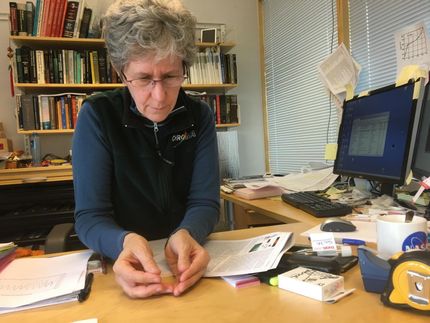Eco-friendly waterborne semiconductor inks using surfactant
A research team of Energy Science and Engineering at DGIST has developed a technology to produce environmentally friendly water-borne semiconductor inks using surfactant, which is additives that mix substances of different properties and a component of soap.

This is a comparison of the waterborne semiconductor ink of this study and that of the previous studies.
Daegu Gyeongbuk Institute of Science and Technology (DGIST)
Polymer semiconductors are carbon compounds showing the electrical properties of semiconductors. It has been highlighted as a next-generation material of wearable smart devices, etc. not only because they are flexible and light in weight, but also they can be processed in a wide area a low cost through the solution process. However, there is an issue that it causes significant environmental pollution as toxic organic solvents are used in the process.
Despite the limitations, the research team has developed a semiconductor surface control technique using surfactants for environmentally friendly semiconductor manufacturing processes that do not use toxic organic solvents and has produced water-borne semiconductor inks.
In the study, the newly developed waterborne semiconductor ink of the research team has small colloidal particles and less surfactant micelles compared to the waterborne semiconductor inks in the previous studies. As a result, it has a relatively flat surface than the conventional waterborne semiconductor inks. The black and white image in the figure shows the comparison of the surface of the thin film made with the waterborne semiconductor ink developed in this study and conventional one.
According to the research team, the technique is expected to be applied in various electronic devices such as P-type and N-type transistors as well as PN diodes, complementary inverters, photodiodes as high-quality thin films.
Professor Chung stressed the significance of the study by stating "This research has fundamentally solved the environmental pollution problem generated during the production of organic semiconductor, which is spotlighted as the core material of wearable electronic devices. We have developed a source technology that can disperse various semiconductor materials into water through the simple chemical modification. We expect that it can be used in various optoelectronic devices ranging from transistors to solar cell, composite circuit, and image sensor."
Original publication
Cho, Jangwhan and Yoon, Seongwon and Min Sim, Kyu and Jin Jeong, Yong and Eon Park, Chan and Kwon, Soon-Ki and Kim, Yun-Hi and Chung, Dae Sung; "Universal selection rule for surfactants used in miniemulsion processes for eco-friendly and high performance polymer semiconductors "; Energy & Environmental Sciences; 2017
Original publication
Cho, Jangwhan and Yoon, Seongwon and Min Sim, Kyu and Jin Jeong, Yong and Eon Park, Chan and Kwon, Soon-Ki and Kim, Yun-Hi and Chung, Dae Sung; "Universal selection rule for surfactants used in miniemulsion processes for eco-friendly and high performance polymer semiconductors "; Energy & Environmental Sciences; 2017
Topics
Organizations
Other news from the department science

Get the chemical industry in your inbox
By submitting this form you agree that LUMITOS AG will send you the newsletter(s) selected above by email. Your data will not be passed on to third parties. Your data will be stored and processed in accordance with our data protection regulations. LUMITOS may contact you by email for the purpose of advertising or market and opinion surveys. You can revoke your consent at any time without giving reasons to LUMITOS AG, Ernst-Augustin-Str. 2, 12489 Berlin, Germany or by e-mail at revoke@lumitos.com with effect for the future. In addition, each email contains a link to unsubscribe from the corresponding newsletter.



























































